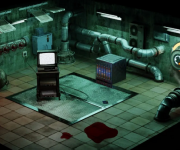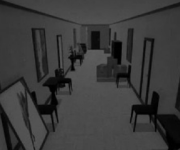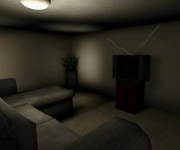Pieces of Me
In Pieces Of Me, the player controls Grisha as he arrives in a familiar town, expecting a visit, but finding quiet instead. What was once ordinary now feels disconnected. The player is not guided toward a goal, but instead must move through spaces filled with unanswered presence. A visit becomes a slow search. There is no urgency, only footsteps, closed doors, and the suggestion that something was left behind — not in items, but in atmosphere.
Reading the Past Without Telling
The school, the apartment, the street — they all offer fragments. There is no character interaction or text to explain what happened. Instead, the game presents a sequence of spaces where meaning is found in what’s missing. Some areas are too dark, some too bright. Some feel lived in, others untouched. The player advances not by collecting objects or solving puzzles, but by choosing to look deeper and stay longer in each space.
Key Elements Found in Pieces Of Me
- First-person narrative walking simulator
- Focus on personal story and emotional weight
- Set in a realistic 2000s Russian environment
- Story progression through environmental changes
- Spin-off title based on the world of September 7th
- Average runtime of approximately 90 minutes
- No combat or enemy mechanics
- Themes of grief, memory, and inner distance
- Rooms that change based on observation
- Uses silence and stillness to communicate meaning
Listening to What the Space Offers
Rather than moving toward a climax, the game invites stillness. Some doors are locked not by keys but by timing. Some notes are more meaningful after other areas have been visited. There is no line between past and present — the environment holds both at once. Walking forward means returning, not escaping. The more attention the player gives to small things — a sound, a light, a sentence on the wall — the more the world responds.
Closing With Less Than Was Hoped For
Pieces Of Me concludes not by solving a mystery, but by acknowledging that some stories only exist in fragments. Grisha’s visit does not restore what was lost. It brings awareness. The world does not explain, it only reflects. What the player takes from the experience is shaped by where they looked and how long they stayed. There is no message spelled out at the end — only the memory of walking through a place that no longer speaks, but still holds weight.







































































